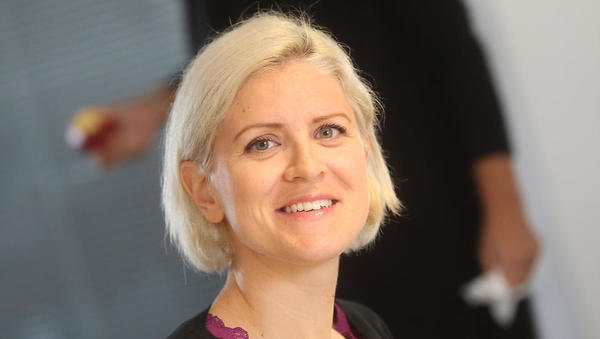Many of the country’s richest people, including Elon Musk and Larry Ellison, borrow against their stock while avoiding capital gains taxes.
On Saturday, Elon Musk promised to sell 10% of his Tesla stake after 58% of people voted in a Twitter poll shared by the Tesla CEO. Yesterday, Musk began to follow through, exercising about 2.15 million Tesla stock options and selling shares to cover the taxes he owed as a result. Prior to this week, he has only ever sold Tesla shares twice—in 2010 and 2016—for pre-tax proceeds of $617 million ($593 million of that went to cover taxes he owed on options). Tesla’s stock has risen over 13,000% since his last sale, and Musk is now worth an estimated $281 billion (based on Wednesday’s closing price).
When the world’s richest man wants cash, he can simply borrow money by putting up—or pledging—some of his Tesla shares as collateral for lines of credit, instead of selling shares and paying capital gains taxes. These pledged shares serve as an evergreen credit facility, giving Musk access to cash when he needs it. Musk currently has pledged 88.3 million Tesla shares, nearly 36.2% of his overall stake (excluding options), as of Wednesday worth more than $94 billion.
Musk is one of 32 billionaires identified in the Forbes 400 list of richest Americans to be pledging public stock of companies listed on the NYSE or Nasdaq exchanges as collateral for current or potential lines of credit, as disclosed in company filings. Other pledgers include fellow mega-pledger Oracle chairman Larry Ellison, Walmart heir Jim Walton, and private equity’s richest person, Stephen Schwarzman. (Three others pledged shares of foreign companies are not included in this report.)
Across all companies listed on the NYSE and Nasdaq exchanges, there are 560 executive officers and directors and 5%+ shareholders currently pledging shares; the size of the average pledge is $427 million and the aggregate value of these pledged shares is $239 billion, according to a report from Audit Analytics, an independent provider of audit, regulatory and disclosure intelligence. Within this larger group, Forbes 400 members do most of the pledging—value wise, that is. Musk’s Tesla pledge alone is 47% of that aggregate pledged share value. Removing the extreme outlier Musk, the remaining 31 Forbes 400 members account for 56% of that figure. (Data for this report were calculated Nov. 5; Tesla shares are down nearly 13% since then).
“At current interest and tax rates, it is far cheaper to borrow against the value of one’s shares than to sell them and pay taxes on the gains.”
Information on companies’ pledging policies—found in annual proxy statements—-offer a window into the murky world of billionaire borrowing. The topic entered the national microscope in June after ProPublica’s report on leaked IRS data showed that several of the richest people paid nothing in federal income taxes in certain years. Last month, a proposed wealth tax from Senate Democrat Ron Wyden failed to win political support. That measure would have taxed unrealized capital gains of America’s richest individuals.
Most details on billionaire borrowing remain private. Individuals who own less than a 5% stake in a company, or who don’t work for that company, do not report stock ownership or pledging of shares to the SEC. Many of America’s wealthiest people—232 billionaires from this year’s Forbes 400 list, to be exact—hold their fortunes primarily in private companies. Any pledges against diversified baskets of stock or private assets are not reported in company filings. Disclosure requirements also do not include reporting whether, or how much, an individual has borrowed against their pledged shares. A few billionaires Forbes contacted said they don’t have outstanding debt against their pledges.
Most larger companies don’t allow pledging: Over two-thirds (68.4%) of S&P 500 companies ban all company employees and shareholders from pledging shares for debt, 22% prohibit pledging but with exemptions for certain individuals, and only 3.4% fully permit it, according to data provided by proxy advisory firm Institutional Investors Service (ISS). “When executives or directors have a significant percentage of their equity pledged, it creates a concern from the investor perspective,” says Jun Frank, an executive director for ISS’ corporate solutions group, which advises companies on corporate governance matters.
Those concerns include margin calls: forced sales of pledged shares that can sink a company’s stock price, which risks cascading into a broader, panic-induced selloff. An example: Green Mountain Coffee Roaster’s founder Robert Stiller borrowed against his company shares to fund an increasingly extravagant lifestyle, rather than sell shares. That worked fine when the share price was rising but quickly unraveled after a short-seller called into question its accounting in May 2012. The former billionaire was forced to sell 5 million shares, worth $126 million, in one day to cover margin calls on pledged Green Mountain stock. He was then removed as Chairman of the Board.
Pledging can also create friction between directors and executive officers pledging shares and outside shareholders, says Frank: “If you no longer have certain claims to those underlying economic interests and you continue to have the voting right, that creates a mismatch between the control you can exercise over the company and the economic interest you have in the company.”
THE FORBES 400 PLEDGERS
Thirty-two billionaires identified in the Forbes 400 list of richest Americans have pledged public stock of companies listed on the NYSE or Nasdaq exchanges.
Sometimes what company founders want, in this case to pledge shares, is at odds with what board members and shareholders want, which is to disallow pledging. The software company Oracle, for example, adopted a rule in January 2018 prohibiting its directors and executive officers from pledging company shares, although one individual was exempt: Larry Ellison, Oracle’s cofounder and largest individual shareholder. But then, as now, Ellison was the only Oracle director to ever report pledging any company shares. Ellison, who boasts a fortune of over $100 billion, has been pledging shares since at least 2007, after the Securities and Exchange Commission began requiring it.
In other words, Oracle’s new pledging policy had no immediate impact on the pledging activity of its directors and executives—Ellison least of all. Since 2018, he has increased the number of his pledged Oracle shares to 317 million — worth about $28 billion — equivalent to roughly 27% of his stake and 11% of all outstanding Oracle stock. Ellison did not sell any Oracle shares between December 2010 and June 2020, a near-decade stretch of big spending for the eccentric billionaire, who splashed $300 million in 2012 to buy the Hawaiian island of Lanai and tens of millions of dollars on opulent mansions, growing a $1 billion real estate portfolio that includes at least ten properties on Malibu’s glitzy Carbon Beach.
While Oracle does not disclose how much Ellison has borrowed against his shares, his penchant for borrowing was revealed in unsealed court documents from a shareholder lawsuit. Those documents, first reported by The San Francisco Chronicle in 2006, showed that Ellison had outstanding loans of more than $1.2 billion in 2001, and that his financial adviser had warned him, “We have a freight train going down a track hitting a debt wall.” (Oracle did not respond to Forbes’ questions about its pledging policy or Ellison’s borrowing.)
Other companies find more creative ways to exempt billionaire founders from pledging bans. Take the oil and gas firm Kinder Morgan, whose prohibition on pledging comes with a caveat: shares owned “in excess of the applicable minimum ownership guidelines” are able to be pledged. The minimum ownership requirement for directors—such as executive chairman and billionaire Richard Kinder—is three times the value of their “annual cash retainer.” Helpfully, Kinder’s annual salary is $1. That means the eponymous cofounder can effectively pledge as many shares as he likes.
Kinder, whose $7.2 billion fortune makes him the 128th wealthiest American, has pledged 40 million shares of his eponymous company — 15.6% of his overall stake, worth $679 million — for the sole purpose of buying more company stock, as described in the company’s proxy statement. To date, Kinder has purchased 10 million additional shares of Kinder Morgan, financed with debt taken out against his pledged Kinder Morgan shares. A representative for Kinder Morgan confirmed Forbes’ interpretation of its pledging rules but declined to comment further.
Some companies are upfront about their exemptions, but fail to make a convincing argument for them. The medical conglomerate Danaher simply states in its 2021 proxy statement that its sibling founders, Forbes 400 members Steven and Mitchell Rales, are exempt from its pledging ban “because [their] shares had been pledged for decades.” Each brother has pledged a significant portion of their Danaher shares, a potential red flag for margin calls: Steven Rales has pledged 78% of his equity stake (just over $10 billion), and Mitchell has pledged nearly 91% of his equity stake (slightly under $10 billion). Together, their pledges are 9.4% of all outstanding Danaher stock. (Danaher and the Rales brothers did not respond to requests for comment).
Of the Forbes 400 billionaires, oil mogul George Kaiser (net worth: $10.7 billion) has the highest ratio of pledged shares to the company’s total outstanding common stock — another red flag for margin calls. His pledge of 21 million shares of bank holding company BOK Financial Corporation (worth nearly $2.3 billion) is equal to nearly 31% of all outstanding stock. But Kaiser says he only occasionally borrows against those pledged shares. “They are just low cost, back-up lines, which we have had in place for a long time and infrequently use,” he told Forbes over email.
Tesla argues that pledging creates a kind of fiduciary relationship between pledgers and shareholders. In 2018 the electric carmaker introduced a 25% loan-to-value limit on borrowing against pledged shares, arguing that pledging gives “executive officers flexibility in financial planning without having to rely on large cash compensation or the sale of Company shares, thus keeping their interests well aligned with those of our stockholders, while also mitigating risk exposure to the Company” — a stance Tesla has reiterated in subsequent proxy filings.
ISS countered this argument in its recent proxy analysis of Tesla’s corporate governance principles. “If an executive who already owns 15 or 20 percent of a company’s outstanding shares…is not already motivated to act in the interests of shareholders, there is no credible argument that increasing that stake to 25 or 30 percent will suffice to accomplish that goal,” says the report. “Perhaps a more salient, though unspoken, factor is that at current interest and tax rates, it is far cheaper to borrow against the value of one’s shares than to sell them and pay taxes on the gains.”
So just how prevalent is pledging assets to borrow among the ultra rich? “Pretty high,” responds Jason Cain, a managing director and chief wealth strategist at advisory firm Boston Private, speaking about his firm’s highest bracket of clients: those with above $500 million in assets. (Cain declined to provide an exact percentage figure). “It’s not any different than families… who borrow for homes” and other life purchases, says Cain. “Most of these clients are aware of the uses of debt and with interest rates where they have been in the recent past, they understand the arbitrage opportunity.”
Ali Jamal, and ex-Julius Baer banker and founder of Azura, a boutique wealth management firm for billionaire entrepreneurs, says that during the stock market crash of March 2020, about 70% of Azura’s clients took on leverage — by pledging shares, but also artwork and car collections — to take on debt to buy more stock. And over the past year, about 40% of Azura clients have leveraged their way into special purpose acquisition corporations. “You can borrow at 40 basis points, max 50 basis points, to have someone very smart” identify an investment opportunity, says Jamal about the appeal of leveraging into SPACs, “and if you don’t like the opportunity, you can pull your money out.”
Borrowing against one’s shares has its risks, but for these billionaires, the rewards seem to outweigh them. “It’s perfectly legal, and it’s a little hard to say it’s immoral. Like, it’s immoral to own a growth stock? It’s immoral to borrow money?” says Edward McCaffrey, a tax law professor at USC Gould School of Law who coined the popular term “Buy, Borrow, Die” to describe how the ultra-wealthy borrow to avoid paying taxes. “So the question is, why would anybody not do it?
SEE THE FORBES 400 LIST OF 2021
MORE FROM FORBESThe Richest Women In AmericaBy Lisette Voytko
MORE FROM FORBESThe 2021 Forbes 400 List Of Richest Americans: Facts And FiguresBy Kerry A. Dolan
MORE FROM FORBES15 Under 40: The Youngest Billionaires On The 2021 Forbes 400By Hank Tucker
Note: This article have been indexed to our site. We do not claim legitimacy, ownership or copyright of any of the content above. To see the article at original source Click Here













